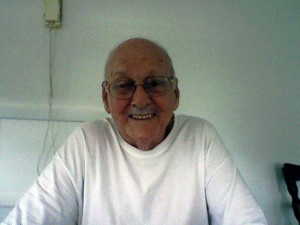
Charles Crye, Class of 1937
Sometimes Charlie Crye would take the car keys from the house after his dad had left for work, drive himself to school, come home for lunch, and return the car before his dad came home, never knowing that his son had driven the car.
Charles enjoyed hanging out at the YMCA especially on Friday evenings and Saturdays to play intramural basketball. He had a paper route like his brothers but gave it up, thinking something else would be more suitable for a senior. He went to work for Jack Everly, Sr., in his shoe store.
He liked to dance and loved the music of the Big Band era. He and his friends Clayton Bartel, Charlie McGuire, and Julian Vigran would go to hear Benny Goodman and Artie Shaw in Dayton. The Lakeside, where you could “come as you are,” and the Miami Biltmore, where they asked you to wear a tux, were two of the favorites for weekends.
After graduation he went to work at NATCO in the engineering department. There were 75 other engineers and he was the youngest. He did not get an exemption when the war began and in August of 1941, he was drafted into the Army. He was part of the 62nd Coast Artillery Battalion and was sent to Algeria-French Morocco, Tunisia, and Sicily.
Charlie had never seen a corpse before going to Africa, and had never even been to a funeral. “Seeing all the dead and wounded makes one lose their sense of reason, thinking that there, but for the grace of God, go I.”
They slept in tents, and at night it was very cold in November. They were constantly strafed by the German Air corp. The Luftwaffe of the German Air Forces kept the Army under constant watch. Radar was fairly new and the alarms would let the men know when incoming traffic was near.
They were given a new gun, a 9 mm that was much better than the 3” guns that the Army had been using. It destroyed German tanks and was highly effective on anti-aircraft.
One of Charles brothers, Allen (1937) reported when Charles did. He saw his brother in Africa. Allen was in Intelligence and was able to find Charles after Operation Torch (11/8/1942- 11/11/1942) was won.
From November of 1942 to May of 1943 the Allies defeated Rommel and the Axis powers in northern Africa, taking more than 275,000 prisoners.
From Africa, Crye was sent to Sicily and Operation Huskey. From July 9 to August 7, 1943, they fought to remove Mussolini from power and followed him into Italy on Sept 3.
The 7th Army was now under George Patton, who took control from General Eisenhower. They took Messina where Charlie remembers seeing and hearing Patton address the troops in Sicily. “I hope you boys kill a lot of those … Germans,” he recalls.
He was also part of the Rome-Arno invasion on the coast of Italy. The terrain was rough and a lot of small battles made this one of the hardest fought campaigns in all of WWII.
In August, 1944 they were sent to France and from there they battled through to Germany.
His brother Allen found him again about 15 miles north of Marcel France two days after the invasion in 1945. They were the first Americans to reach the Rhine River and fought a major battle in Alsace and Lorraine where the 7th had lost many men.
When asked if he got much mail, he comments that he never got his real mail but “V” mail, which was a photograph of his mail but much smaller and harder to read.
Charlie recalls the end of the war in May of 1945.
He was in Germany and heard a song playing on a radio. It was Catch a Falling Star by Hoagie Carmichael. “I remember hearing the first two lines and I blacked out. The next thing I remember I was sitting on a train in Boston and a lady was leaning over me asking me ‘would you like some chocolate milk and a donut?’ It was now August of 1945 and I still to this day do not know what became of me all those days.”
Perhaps the boy who had never seen a corpse or war had seen too much. Perhaps the song of his high school weekends brought back memories of home and, though he was not injured physically, he was hurt.
“I remember the train came through Columbus, Ohio, and through Richmond. Oh, I wanted so to get off the train, but had to stay on until we reached Indianapolis and I was later released.”
Charles came back to Richmond and attended the University of Cincinnati on the GI bill to study engineering. He left school to take care of his sister, Elizabeth Crye Hartzler, class of 1949, after his mother died. He took classes at Earlham for a short while but, with having to work, he soon had to drop out. He worked various jobs and met his wife in 1959.
In 1960, he ran into his former classmate Joanna Hill Mikesell and her husband Dick. They offered him a job at Hill’s Roses. After two years they asked him to manage the Richmond plant. He supervised 20 employees and remained there for 25 years, retiring in 1985.
He often traveled to the other 15 corporations of the Hills Rose Company around the Midwest. They were located in Indianapolis; Atlanta, GA; Charleston, WV; Dayton, OH; Cincinnati, OH; Louisville, KY; Detroit, MI; Ann Arbor, MI; Toledo, OH; Cleveland, OH; Youngstown, OH; and Columbus OH.
He remembers his first trip to Chicago. He smoked cigarettes at the time. “I lit a cigarette as soon as the pilot said it was okay and before I could smoke all of it, he came back on saying we were ready to land.”
Roses were shipped by train from the Depot in Richmond. Cardboard boxes filled with dry ice were used with the roses being loaded daily just 30 minutes before the train would leave for all parts of the US.
His memories of Morton are fond ones, especially of Miss Ratliff, Emily Murphy, and Miss Finfrock.
Mr. Holder was his home room teacher. He was no-nonsense–“boys didn’t attempt to roll any marbles on the floor in his class.”
Charlie Crye was awarded eleven bronze stars, one for each battle he endured. His best friend from high school was classmate Bill Little who also served in WWII. He carried shrapnel in his back his whole life because the army surgeons told him it was too close to his spine to remove. Over the years, as he aged, the shrapnel moved until one day it was fatal. The war took Bill, not as a young man, but as an old friend.
Charlie’s blue eyes tell of a man who has had a good and full life. He is the father of three sons, Don, Jack and Berry, who all live out west.










